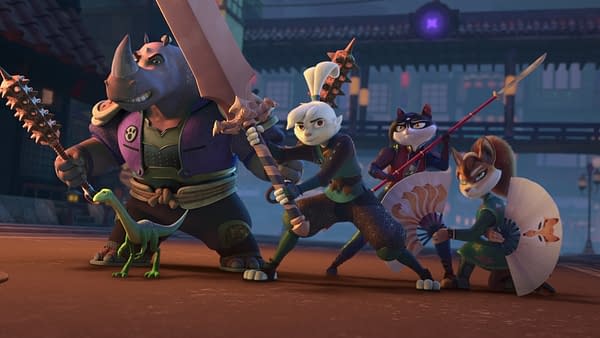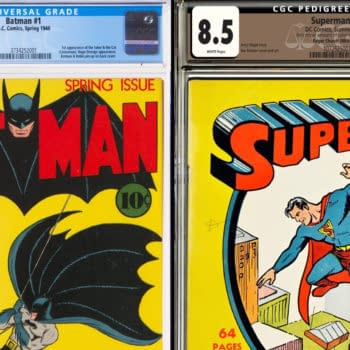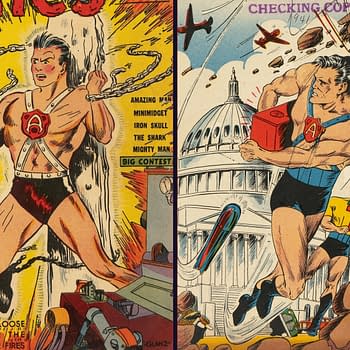Posted in: Netflix, TV | Tagged: netflix, Samurai Rabbit: The Usagi Chronicles, stan sakai, usagi yojimbo
Samurai Rabbit: The Usagi Chronicles Charts Its Own Course: Review
Usagi Yojimbo creator Stan Sakai has embraced the notion of expanding his comic book saga to other mediums since almost the very beginning. From a computer game during the Commodore64 era to a stage play a few years ago, the strength and clarity of Sakai's storytelling vision have long inspired others to help extend that vision outside of comics. There was a time when the notion that the titular Samurai Rabbit of this series is not the Usagi Yojimbo of the comic books would have been cause for concern among comic book fans, but that time is largely past. We live in a world where there are comic book, film, and television versions of a given character living their separate fictional lives all at the same time, and the audience not only understands but sometimes enthusiastically embraces the differences. Netflix's Samurai Rabbit: The Usagi Chronicles season one establishes a new character in a new world which draws inspiration from the Usagi Yojimbo of the comic books in a very direct way.

The title character of Samurai Rabbit: The Usagi Chronicles is Yuichi, a descendent of the warrior Miyamoto Usagi (the Usagi Yojimbo of the comic books). Yuichi's greatest desire is to become a true samurai, and he is periodically shown drawing inspiration to that end from Miyamoto Usagi by tapping into visions of his historical adventures which are depicted in an animated hand-drawn illustration style. This is a neat device that clarifies how all this fits together: the futuristic CGI-animated world of Neo Edo drawing inspiration from the hand-drawn history of the original.
Art Director Khang Le and the art department for this series deserve a lot of credit for creating that futuristic world of New Edo while giving it some obviously historic stylistic roots. This sensibility is reinforced by composer Aiko Fukushima's music for the series, which is a clever combination of traditional and modern. The creature and monster designs from throughout the season are another stand-out element of the saga. All of this serves as a well-crafted platform for the main characters, and the chemistry among Darren Barnet (Yuichi), Mallory Low (Chizu), Aleks Le (Gen), and Shelby Rabara (Kitsune) really makes it all work. Yuki Matsuzaki, who first played Miyamoto Usagi in Teenage Mutant Ninja Turtles (2012 TV series), reprises that role for the historic flashbacks here, calling the character "the single and the most significant character I was asked to play in my entire acting career."
Samurai Rabbit: The Usagi Chronicles is a series designed for a new, younger audience. While the violence is restrained, there's still an abundance of action and conflict, and there's plenty here to keep adults and fans of the comic book invested in the story as well. The team behind the series has created a world worthy of the Stan Sakai comic book saga that began in Albedo #2 in 1984.
Samurai Rabbit: The Usagi Chronicles follows the teenage rabbit, Samurai Yuichi, descendent of the great warrior Miyamoto Usagi, on his epic quest to become a true samurai. But he isn't alone! He leads a ragtag team of misfit heroes – including a roguish bounty hunter, a cunning ninja, an acrobatic pickpocket, and a faithful pet lizard – as he battles depth-charging moles, metal-tipped winged bats, and monsters from another dimension, all in the pursuit to become the best Samurai Usagi!
Gaumont's Nicolas Atlan, Terry Kalagian, Sidonie Dumas, and Christophe Riandee also serve as executive producers along with Dark Horse's Mike Richardson, Keith Goldberg, and Chris Tongue and Atomic Monster's James Wan, Michael Clear, and Rob Hackett. Mumbai-based 88 Pictures (Trollhunters, 3Below: Tales of Arcadia, Fast & Furious Spy Racers) has been named as the CGI animation studio.
















